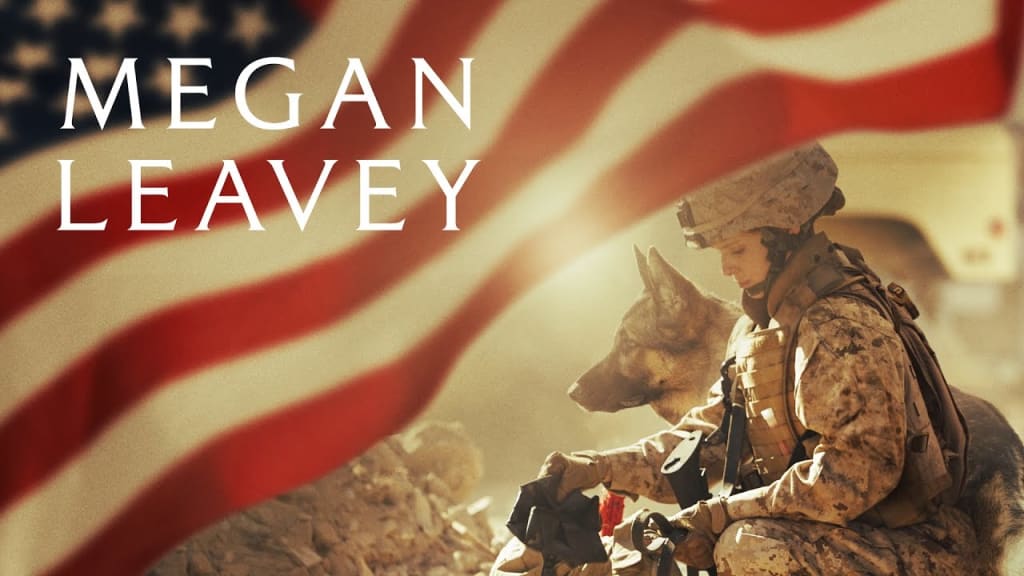The Hidden Story Line In Megan Leavey
(That only women veterans will see.)

I went to see Megan Leavey with the expectation of being either extremely unimpressed with the story line itself or very angry with the depiction of women in the military. I did not have either of these happen and found myself pleasantly surprised with what the movie did portray. Don’t get me wrong. There was the usual Hollywood-ization of the military that we all hate – that there was no commonsensical progression of Megan’s boot camp training to becoming a K9 handler (yeh, sure, all boots just get handed a dangerous dog to train one day after it bites its handler and crushes several bones in his hand) or in their flight to or disbursement within Iraq (please, if you got on one plane in California and got off the same plane in Iraq without any stops and immediately were transported to your FOB, I’m curious to hear about it). Also, there are no Rip-its in this film. Worst of all, there was a serious lack of the perfect gelled/sprayed hair and sock buns that women Marines are known for – not that we really saw any women Marines besides Leavey after the extremely boot camp scenes.
This is where we find the hidden story line. This film was billed as a story of the bond between a Marine and her military working dog, but the woman director seems to have done a better job of portraying what it is like to be a woman in the military (albeit, a very sanitized, PG version) than it does to portray the bond that Megan had with Rex. But it is unlikely that many will see, or even understand, this part of the story as it is one only understand by those who have experienced the hyper-gendered environment of the military as a woman.
Megan is a small town girl from New York, graduating from high school just prior to 9/11 and experiencing difficulties with her mother and stepfather, holding down a job, and alludes to (and then later on in the movie confirms) losing her best friend to a drug overdose. Megan says, “What was the final straw? I had nothing.” When you have nothing, the military can be a great option to find something.
After a very rushed scene of Marine Corps boot camp (more resembling a Katy Perry video than reality, methinks) PFC Leavey finds herself as a military police officer at Camp Pendleton, California. She and two others – presumably the only other women standing in ranks - are called out and welcomed in their first muster, and given the reminder by their section leader that they must, “Make us proud” to be part of their group. Of course this is the set-up for the next scene in which they get into trouble.
After a brief but empowering scene at a bar where the 3 women fend off a potential harasser, they are seen walking through the base while intoxicated. One complains about her stilettos she is wearing – which made me laugh as the need to perform ultra femininity and wear high heels when off-duty is a common theme in women veteran identity research. As the unnamed woman stops to remove her shoes, Megan decides to drop trou and pee – apparently on the Provost Marshall office wall. She is caught, the other two women disappear completely from the story line, and the next scene finds PFC Leavey being screamed at for “disrespecting the men and women who made the Marines great” and being assigned (literal) shit-duty at the kennels for a week.
This is where the hidden story line really begins. PFC Leavey will only be in contact with almost exclusively men for the remainder of her story being told to us. There are occasionally women present, but they are either silent background figures or antagonistic figures set against Leavey bettering herself – such as her mother who continues to not understand or support her or the veterinarian who insists that Rex is a dangerous dog to everyone. Leavey’s entire experience is set up and defined by the expectations and guidance of the men that now dominate her life.
While I was initially annoyed when I realized this film – centered around one woman’s true story – could not even pass the Bechdel test, I soon realized that this is the actual truth that resembles women’s experiences in the military. Our story is told by men. Our expectations are set by men. Our guidance – good or bad – is given by men. Our sense of belonging is determined by men. Everything that Leavey experienced in the story told to us reinforced this.
The film approached sexism in the military in a very PG fashion. Leavey encountered very light sexist ridicule and hazing while proving herself worthy to be a dog handler. She stood silently in ranks while the gunnery sergeant challenged the masculinity of all the men around her with his inquisition on their sex lives. These scenes are also quickly followed by a senior dog handler telling the younger Marines about the “shit creek” that is Iraq and what to expect, and that K9 handlers will be hated by the grunts. Leavey likely recognizes not only that she is in a great divide due to her gender, but also due to being a K9 handler.
Leavey deploys to Iraq and is separated from her team during their assignments. As they part ways, she calls out, “See you later, idiots”, showing that she has become part of this team by engaging in behavior that resembles their own. But in the next scene we find her and Rex in a CHU by themselves – as she is the only woman at her FOB and she must again prove herself to be a worthy Marine. She spends much of her initial time alone, with the exception of flirtatious scenes with the other male dog handler, Corporal Morales. When Morales and Leavey prepare for her to go out on her assignment, she is told by the senior leader that, “The last female handler got her panties in a pretzel because we don’t allow female handlers on missions, only ECP’s (entry control points), is that a problem?” Leavey has been told her place and we continue to see her alone, being yelled at by fellow Marines, or being stared at in a sexual manner.
Leavey knows, as most women in the military do, that she must be better than all the men in order to receive half the recognition that they do and strives to prove herself worthy of inclusion. When she and Rex are spending their down time training, the men are playing cards and one asks, “Do these guys ever take a break?”
Leavey is finally taken on a last minute mission when no other K9 handlers are available to go (also seems to be a pretty common theme among women who have deployed to combat zones, that their skills are not valued until there are no men remaining or available to do the job). She succeeds on this mission when Rex locates a stash of various bombs and weapons. In addition to now being allowed to go on missions regularly, she is also welcomed to join the group in their downtime and relaxation, deepening their respect for her as a team member and opening up opportunities for her budding romantic relationship with Morales. Whereas men are always already part of this in-group, women must first prove their worth to the team to be allowed to receive a similar return on relationships.
It is not long after this that Leavey encounters the IED that changes her life (only in movie time, in real life Leavey had two deployments to Iraq and was injured on her second). Despite being injured from the blast, Leavey pushes for her and Rex to continue on their mission to secure the area with her team, when a 2nd explosive blast and firefight occurs. Rex does his best to protect both Leavey and fellow Marines from the danger he is sensing while Leavey again experiences a drop in status as she is blamed for not finding the initial IED (despite their having already located a large amount judging by the flags placed on the scene). Throughout this significant event, Leavey maintains her emotional control until she is placed on a medevac flight and separated from Rex.
We next find Leavey in the hospital and she is being told she will go home for the holidays and then return to Camp Pendleton for therapy. She is distraught over not having Rex nearby and is unable to get answers on his status over the next several weeks. While at home, Megan’s mother buys her a make-up kit – a gift Leavey obviously views as strange and not really meant for her. There are several scenes that go through Leavey hearing that Rex has been reassigned to another K9 handler since she will likely not be able to return to full duty and she decides to not reenlist.
Leavey’s exit from the military is portrayed as awkward and short as her entrance. Back home, Leavey struggles to adjust and work through her traumas. While her mother is focused on the stress that Leavey is causing her and her stepfather, she finds her father to be more supportive, even if he struggles to know what to do for her. Leavey also finds herself in group therapy where she is the only woman (besides the therapist). It is known that Leavey is mourning for Rex not being in her life and the therapist asks what she would say to him if he were there. Leavey responds, “I’d thank him for trying to teach me what love is”. This is the climax of the film. While we are still taken through the (not entirely true) journey of her fight to adopt him upon his retirement, we have already been given the moral of the story.
Rex was a dog that challenged Leavey to be a better person as well as a better Marine. Leavey found a purpose in striving to be part of the military working dog world, caring for this difficult dog, and he saved her life in return. But Rex also provided another sort of protection for Leavey as she fought for her identity to exist in multiple environments that would not support her. He shielded her from the sexual advances and inappropriate behavior of her fellow Marines. He provided a conduit for her to pursue a safe and respectful relationship with a fellow dog handler (I laughed at Rex keeping a close eye on Morales as they played cards and talked intimately late into the evening. I did not laugh at the father’s “is this some guy I’m going to have to chase off with a shotgun” comment). Rex gave Leavey purpose and want to work through her traumas when she struggled to adjust to post-military life after leaving the Marine Corps. Leavey recognized a warrior status in Rex that she did not seem to be willing to give herself. Leavey found that bringing a bit of who she was in the Marine Corps in to her post-military life was what allowed her to experience post-traumatic growth. Rex provided Leavey the opportunity to be recognized as a woman combat veteran at a time when our nation struggles with this as a reality.
Megan Leavey does not provide the excitement that many war or military movies do (although the one firefight scene is expertly shot). The story is nuanced, a slight twist on the love stories between humans and animals that are often portrayed in film. But the pleasant surprise of a filmmaker subtly sharing the experience of many women in the military makes this well worth a view.
About the Creator
Amber Mathwig
Amber is a 10-year veteran of the United States Navy & currently works in higher education helping veterans transition to college. She writes on gendered military culture, post-military transition, socialism, & feminism.






Comments
There are no comments for this story
Be the first to respond and start the conversation.